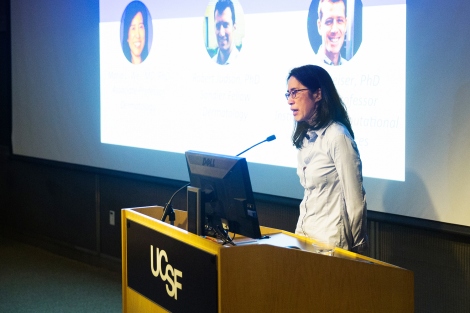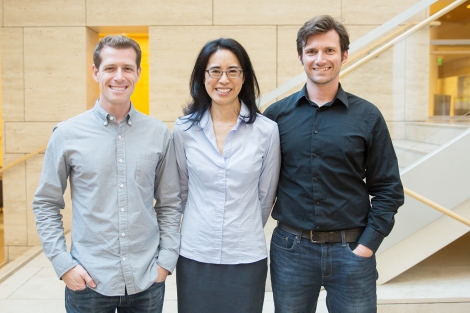Artificial Intelligence Melanoma Detector Wins Cancer Center Impact Grant

A proposal for an artificial intelligence-based skin cancer screening tool won the 2017 Cancer Center Impact Grant, a $250,000 award to support high-risk, high-reward research projects that are unlikely to be funded by conventional sources.
The Cancer Center Impact Grant, which provides $250,000 over two years, was launched last year by the UCSF Helen Diller Family Comprehensive Cancer Center to encourage novel, impactful studies that address a key problem in cancer. Any member of the UC San Francisco community, including students, staff and faculty, were eligible to apply.
“We want this to stimulate new ideas,” said Alan Ashworth, PhD, FRS, president of the UCSF Cancer Center, in his opening remarks at the event. “We acknowledge the fact that you might fail. The only way you get big reward is with big risk. This scheme is to try and do the not blindingly obvious and really do something unusual that will make a big impact.”
Five Impact Grant Finalists
- Catherine Carbone; Nadja Kern; Meghan Morrissey, PhD; Xiaolei Su, PhD; and Adam Williamson, PhD
Engineering cross presentation to promote anti-cancer immunity
- Hal Chapman, MD
Dietary trihydroxy polyphenols as agents to attenuate cancer invasiveness and metastasis by cell-selective targeting of LOXL2 and TGFB1
- Pao-Tien Chuang, MD, PhD
A new approach to identify functional mutations in individual lung cancer patients
- Scott Oakes, MD; and Ed Roberts, PhD
Using the Unfolded Protein Response (UPR) to Unmask Tumor Antigens
- Maria Wei, MD, PhD; and Robert Judson, PhD; and Michael Keiser, PhD
Harnessing artificial intelligence & molecular diagnostics for rapid and accurate melanoma screening and diagnosis
The winning project was presented by Maria Wei, MD, PhD, associate professor of dermatology; Robert Judson, PhD, Sandler Fellow in dermatology; and Michael Keiser, PhD, assistant professor in the Institute of Neurodegenerative Diseases. Their team was among five finalists chosen to present their proposals in a live “Shark Tank”-style pitch event held June 14.
From an initial pool of 50 applications, including teams and individuals, five finalists were selected to give five-minute presentations and take 15 minutes of questions from the audience in Byers Auditorium. A judging panel of UCSF faculty was interspersed throughout the audience but remained anonymous during the event.
The final proposals this year ranged from engineered immune cells that improve cross-presentation, to a raspberry-derived enzyme that blocks fibrosis, to a one-mouse-one-patient model for studying lung tumors.
After a 30-minute deliberation behind closed doors, the judging panel presented the award to Wei’s team.
Her team is developing a scanning tool for detecting melanoma, which has a 100 percent survival rate if found early. The current standard of care is visual inspection of the skin by a clinician, which can be difficult, especially if a patient has hundreds of moles.
The team is currently training a computer algorithm to look across thousands of images of skin lesions and observe patterns.

They plan to combine the image information with biomarker information collected at a UCSF melanoma clinic to create a scanning tool that will outperform clinicians. With more accurate melanoma detection, they may be able to decrease the number of skin lesions that need to be excised.
Wei said with the new funding, the team’s first step will be to bring their tool into the clinic. “I’m so grateful that the Cancer Center is supporting us,” she said. “I feel like with this, we can really make a difference with our project.”